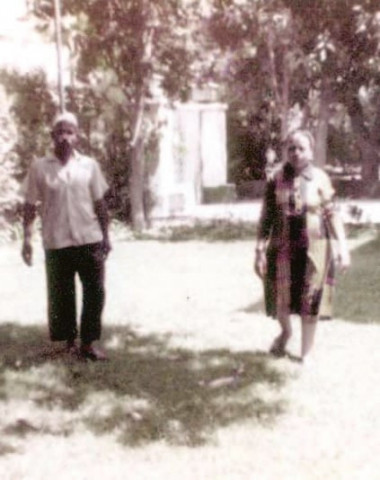The house that Sadat lived in
This time the author takes us to Egypt, to the moment when Hosni Mubarak came to power.

The house that Sadat lived in
Every day necessities were not available in Egypt at that time. My father had to buy small things like toothpaste in Kuwait, which he travelled to frequently. This was a massive change for my family since in Libya, at that time, everything was readily accessible. There was a time that our housekeeper bought about 3-4 kilograms of butter at one go. My mother was astonished, and asked her why she made such a huge purchase since our family obviously couldn’t consume that much butter. Her reply was: “Madam, it was a necessary purchase. I don’t know when it will be available next.”
It seemed that Sadat wanted to pay heed to the World Bank’s policies, in order to be able to receive loans from them so that Egypt’s debts could be relieved — policies that meant the end of subsidised food. However, when people started rioting, the state reversed its position.
Shortly afterwards, President Anwar Sadat made a historic visit to Israel for peace. Many western countries and even Egypt lauded Sadat for taking such a bold step and encouraged it. However, many Middle Eastern countries, especially Libya, (which was the main supporters of Pan-Arabism) claimed that Sadat was a sell-out. If you took Sadat’s side, you were a liberal dog. If you opposed him, you were a radical fundamentalist. However, prior to him trying for peace in the region, he did make a surprise attack in 1973 called the Ramadan War. Therefore, the only way to get around this was trying to instill some stability in the region through a treaty. The very day Sadat went for his trip, his wife Jehan Sadat hosted a coffee morning with all the ambassadors’ and government elites’ wives just to keep things calm, so that she wouldn’t have to constantly think of the dangerous risk her husband was taking.
After this, the economy seemed to be getting more stable, along with the country’s international relations. My family and their friends saw Egypt steadily progressing. However, shortly after my birth, the assassination of President Anwar Sadat took place, during a victory parade held in Cairo to celebrate Egypt’s crossing of the Suez Canal. My family remembers seeing the parade on the television live broadcast. My mother says: “The parade went berserk; we didn’t understand what was happening. All of a sudden the network cut to the Talawat, then they announced President Sadat had been assassinated. The whole day, the network played the Talawat and they showed Jehan Sadat running towards Sadat’s body and her yelling to the bodyguard, ‘What did you people do? What did you people do to him?’”
My eldest sister recalls that when they showed this footage on the local TV channel, our housekeeper wept piteously as she sat in front of the TV and kept saying in distress, “They killed such a good man, he was such a good leader, why did they kill such a good man?”
Hosni Mubarak took over as President while Egypt grieved. A couple of years later my family and I moved back to Pakistan. To this day they all remember Egyptians as loving, warm, and welcoming people, with a rich culture and strong history. Time and time again our Pakistani friends who were with us in Cairo would return to visit. After some 15 years or so, one of them mentioned how it was again becoming very difficult for the common man in Egypt to buy certain food items — chicken, for example. A couple of years later our housekeeper came to visit us with another Pakistani family that she had started to work for when we left. According to her, Egypt was not the same anymore.
I don’t remember anything about Egypt, and of course Libya is all stories to me. Regardless, there is a certain melancholy and a strong sense of relief that my family and I feel when watching the revolution happen. Tahrir Square was where my parents strolled with my push-chair and my sisters walked on either side. We hope that Egyptians get through this ordeal.
When the situation has stabilised in Libya and Egypt, I’d like to make a small visit; just to see how fierce the desert wind blows and how strong the currents of the Nile flow.
Published in The Express Tribune, Sunday Magazine, July 3rd, 2011.



















COMMENTS
Comments are moderated and generally will be posted if they are on-topic and not abusive.
For more information, please see our Comments FAQ